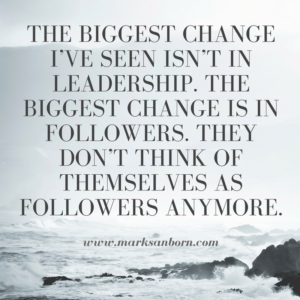 An audience member recently asked me, “What is the biggest change you’ve seen in leadership in the past 30 years?”
An audience member recently asked me, “What is the biggest change you’ve seen in leadership in the past 30 years?”
I didn’t have to think about it long. “The biggest change I’ve seen isn’t in leadership,” I replied. “The biggest change is in followers. They don’t think of themselves as followers anymore.”
When was the last time you heard someone say, “I’m a follower?” or “I follow my leader”? We “follow” differently on social media, but that’s where it ends for most.
Nobody wants to think of him- or herself as a follower at work. They think of themselves much differently, despite how manager and leaders think and talk about those on their team.
Today, the people you lead want to be recognized as team members, contributors, and collaborators. They recognize their relationship to a manager on the org chart, but think of that as only a line of authority. Being considered or treated as a follower is likely considered as negatively as a customer service rep feeling treated like a servant.
The way you talk about those you lead affects how you think about them. If you want to improve your leadership effectiveness, begin by recognizing how those you lead want to be considered, called and treated.
Do you need to think differently about those you lead?
Enjoyed this blog? You might also be interested in:










Followers, some still want to be
But they will not admit it with glee
It should be agreed
Where you are, you can lead
All advance, that’s a bold guarantee
Great answer and you’ve nailed this one Mark. Leadership principles have not changed. They are rock solid. Followers have changed.
And you’re right… Leaders need to be cognizant of what they call the people they lead.How do we do this respectfully without causing tremendous extra work?
Indeed leadership principles have not changed. They may have evolved and developed, but the basis is still the same